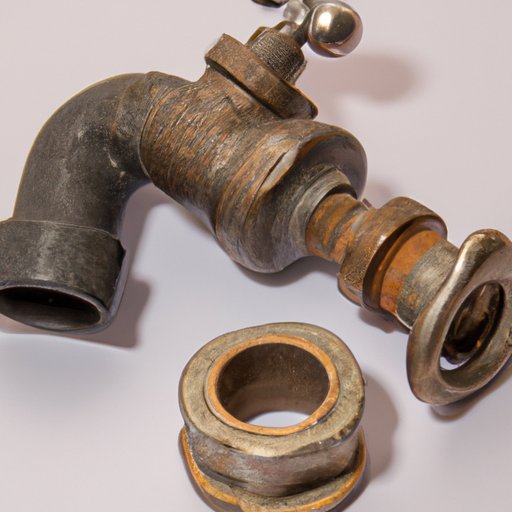Introduction
Plumbing is an essential part of modern life. From indoor showers to outdoor irrigation systems, plumbing plays a critical role in providing clean water, disposing of waste, and maintaining proper sanitation. But have you ever wondered when plumbing was invented? In this article, we’ll explore the history of plumbing, from ancient times to the present day, and discuss the impact it has had on modern society.

History of Plumbing: A Look at the Invention of Plumbing
The earliest known plumbing systems date back to ancient civilizations. The Indus Valley Civilization, which existed from 3300 to 1300 BCE, is believed to be the first civilization to have developed a plumbing system. This system included clay pipes and drains made from stone and brick. Other ancient cultures, such as the Egyptians and the Romans, also developed advanced plumbing systems that used aqueducts, sewers, and baths.
Plumbing materials have evolved over time. Early civilizations used clay pipes, while later civilizations used lead pipes. In the 19th century, cast iron pipes became the standard for plumbing, and in the 20th century, polyethylene pipes were introduced. Today, copper and plastic are the most commonly used materials for plumbing.
The invention of plumbing has had a profound impact on modern society. According to the World Health Organization (WHO), “access to safe water and sanitation is essential to health, well-being, and human development.” Thus, plumbing has contributed greatly to improved access to clean water and increased sanitation standards around the world.
Exploring Ancient Plumbing Systems and How They Shaped Our Lives
The Indus Valley Civilization was the first known civilization to develop a plumbing system. This system included clay pipes that carried water from public wells to homes and businesses. The pipes were made from clay and were sealed with tar or bitumen to prevent leakage. These pipes were used to transport water and wastewater, as well as to irrigate fields.
The Egyptians and the Romans also developed sophisticated plumbing systems. The Egyptians built a large network of canals and irrigation systems, while the Romans constructed aqueducts and sewers. Both civilizations used lead pipes and marble baths, which served both practical and decorative purposes. These ancient plumbing systems laid the foundation for modern plumbing.
Ancient plumbing systems had a profound effect on our lives today. For example, the Romans developed a complex sewage system that allowed them to dispose of waste safely and efficiently. This system provided a model for modern sewage systems, which are still in use today. Similarly, the introduction of public baths by the Romans helped spread the use of hot water, which is now a common feature in many homes.

From Clay Pipes to Polyethylene: The Evolution of Plumbing
Early civilizations relied on clay pipes to carry water and wastewater. These pipes were made from fired clay and were sealed with tar or bitumen to prevent leakage. As civilizations advanced, they began to use lead pipes, which were more durable and resistant to corrosion. Lead pipes were used until the 19th century, when cast iron pipes became the standard for plumbing.
In the 20th century, polyethylene pipes were introduced. These pipes are lightweight, flexible, and less prone to corrosion than metal pipes. They are also cheaper and easier to install, making them the preferred choice for plumbing today.

The Impact of Plumbing on Modern Society
The invention of plumbing has had a significant impact on modern society. Access to safe water and sanitation is essential for good health, and plumbing has helped make this possible. By providing clean drinking water and efficient wastewater disposal, plumbing has helped reduce the spread of waterborne diseases and improve sanitation standards around the world.
Plumbing has also improved convenience. Indoor plumbing has made it easier to take showers, wash dishes, and do laundry. Outdoor plumbing has allowed us to irrigate crops and gardens, and to fill swimming pools and fountains. Without plumbing, many of these tasks would be much more difficult.
What Are the Benefits of Plumbing?
Plumbing has numerous benefits, both for individuals and society as a whole. On an individual level, plumbing provides increased convenience and improved hygiene. Indoor plumbing makes it easy to take showers and wash dishes, while outdoor plumbing helps keep gardens and lawns healthy. Plumbing also helps keep homes and businesses clean and free from bacteria and other contaminants.
On a larger scale, plumbing helps protect public health by providing access to clean water and efficient waste disposal. This has helped reduce the spread of waterborne diseases and improved sanitation standards around the world. In addition, plumbing has helped stimulate economic growth by creating jobs in the construction and maintenance industries.
Plumbing Innovations: Past, Present, and Future
Plumbing technology has come a long way since the days of clay pipes and lead pipes. Recent innovations in plumbing include the use of smart sensors to detect leaks, automated shut-off valves to reduce water waste, and water-saving fixtures such as low-flow toilets and showerheads. In the future, we may see even more advanced plumbing technology, such as self-cleaning pipes and sensors that detect water contamination.
One thing is certain: plumbing will continue to play an important role in our lives. As our population grows and our need for clean water and efficient waste management increases, plumbing will continue to be an essential part of life.
Conclusion
Plumbing has been around for centuries, but its importance should not be underestimated. From providing access to clean water to improving sanitation standards, plumbing has had a profound impact on modern society. In addition, plumbing has improved convenience and created jobs in the construction and maintenance industries. Plumbing is an essential part of life, and its importance will only increase as our population grows and our need for clean water and efficient waste management increases.
(Note: Is this article not meeting your expectations? Do you have knowledge or insights to share? Unlock new opportunities and expand your reach by joining our authors team. Click Registration to join us and share your expertise with our readers.)
